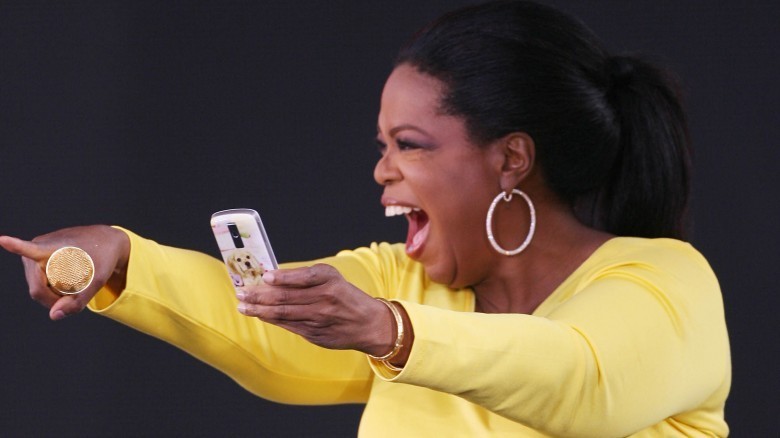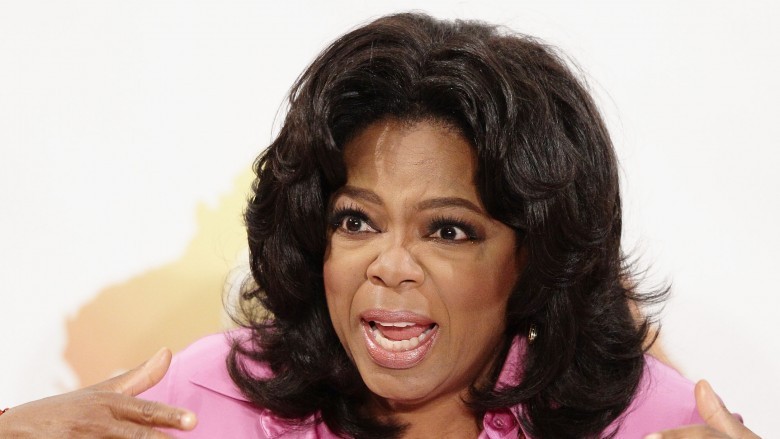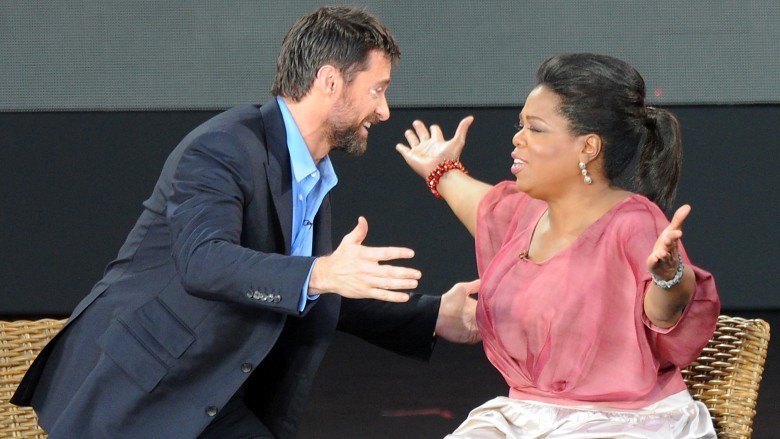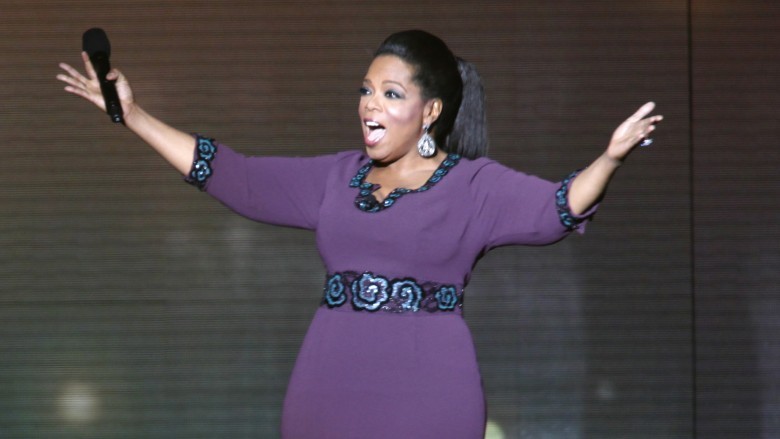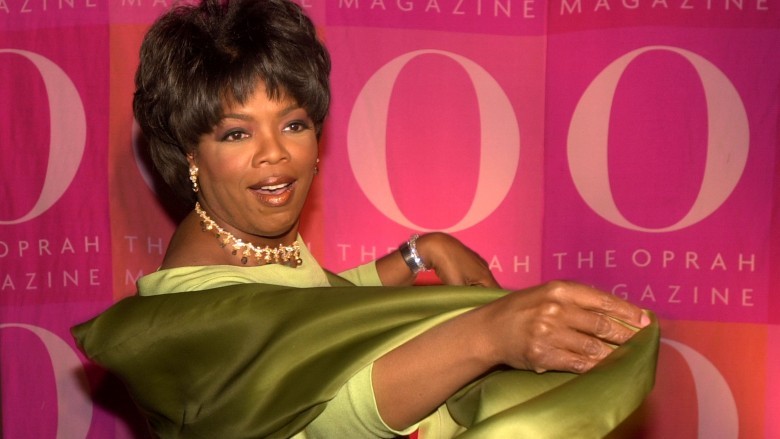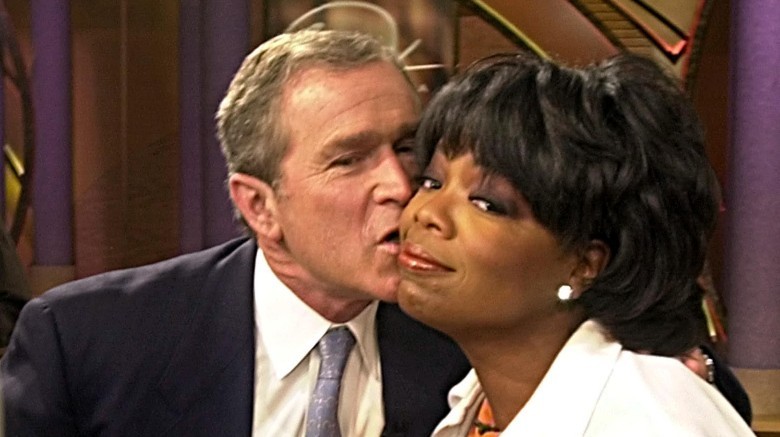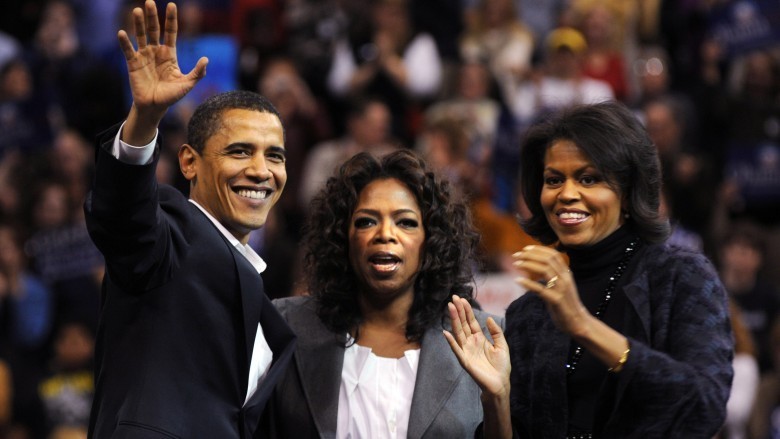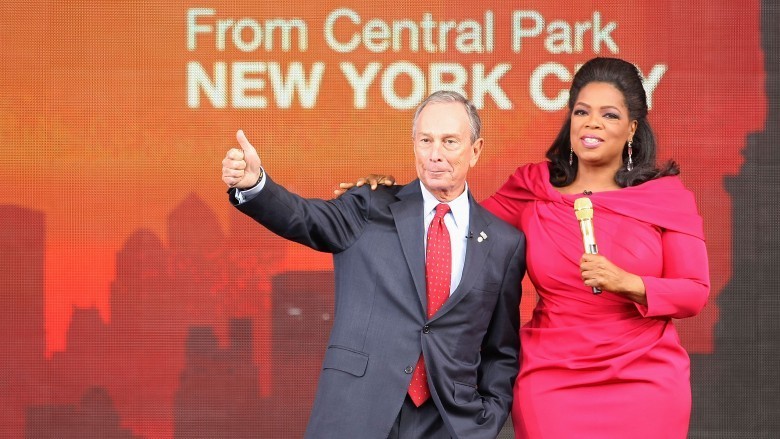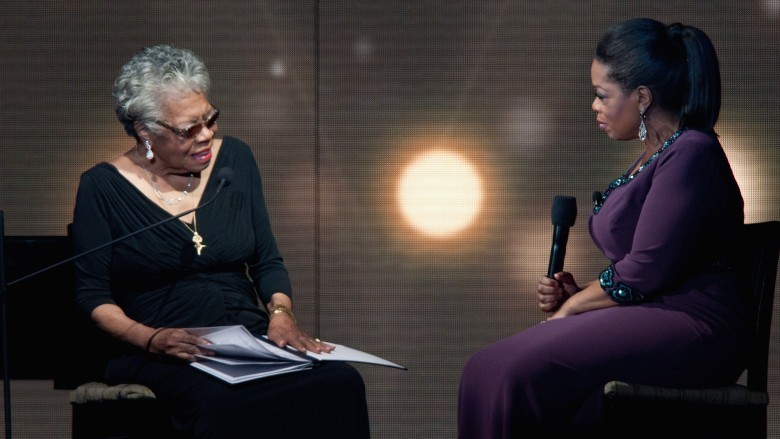The Untold Truth Of The Oprah Winfrey Show
We may receive a commission on purchases made from links.
When you think about memorable moments from The Oprah Winfrey Show (1986-2011), you may think of clips of her wheeling the wagon of fat, or shouting "You Get a Car!," or watching Tom Cruise jump on her couch, or even seeing her lay the smack down on A Million Little Pieces author James Frey.
But those are just a few of the compelling things about Oprah's groundbreaking talk show. Think you've seen it all? Here are some of the things you don't know.
She looked pretty tacky and sounded very earthy when she started out
The 2016 NPR podcast Making Oprah talks about how just who she was — an overweight African-American woman — was so groundbreaking at the time. She started hosting A.M. Chicago in 1984. Her show was an immediate hit and was shortly renamed The Oprah Winfrey Show. It was nationally syndicated in 1986. While Oprah's show definitely had some similarities at first to crosstown Chicago rival Phil Donahue (he was one of the guests on the Making Oprah podcast) she was unlike anybody on TV before. Oprah once described her look in her Chicago debut as "just a Jheri curl and a bad fur coat," a far cry from the elegant attire and perfectly styled hair in later years. The ads for her show from those days looked a little low-rent, too, as did the topics.
Making Oprah also featured a clip from Oprah's first national show in 1986, in which she talked about having hives under her armpits from nervousness. An interview with the Washington Post that same year references that moment, and also makes some unfortunate fat jokes at her expense, starting out with the unflattering lede, "This is fat city." It continued with offensive lines about her like, "Her hips are the size of a Castro convertible." Yikes.
Oprah comes off as pretty unguarded in her interview, talking about her love life, her weight, her boyfriend Stedman Graham's body, and how she's "not a sleaze or a slut." Back then, Oprah was earthier — and perhaps a bit more relatable — than she appears now.
It was her plan B
Oddly, given that the 1986 Washington Post interview she gave was ostensibly to promote the new show, Oprah told the paper about what she really wanted to do — act. After all, she did earn an Oscar nomination for her role in The Color Purple (1985). She confessed this to the interviewer, saying, "So when you mention great actresses, you'll have to say my name: 'Meryl...Oprah,' 'Hepburn...Oprah.' That's what I want. What I am is an actress. I don't get paid for acting. But I was born to act."
She has done a few movie and TV roles over the years, most notably in 1998, when she produced and starred in the movie Beloved, based on the Toni Morrison book. But despite incessant promotion on The Oprah Winfrey Show, as well as a flood of media coverage about the movie (including a Vogue cover), Beloved was a huge flop, beaten by The Bride of Chucky at the box office. She told Piers Morgan in a 2011 CNN interview (via Entertainment Weekly) that she ate about "30 pounds" of macaroni and cheese after she fell into a "depression" when the film flopped. At least she knew what she was feeling. "I recognized, 'I am depressed,' because I'd done enough shows" to know what depression was, she shared.
Oprah is currently co-starring in the OWN Network's Greenleaf. But because of her immense fame and very recognizable voice, it's often hard to see Oprah as anybody else but herself. It makes one wonder if she could have become a movie star if the TV show hadn't worked out. While she's not mentioned in the same class as Meryl and Hepburn as a great actress, David Letterman did compare her name to Uma Thurman's at the 1995 Oscars. No wonder Oprah didn't talk to him for so long.
Everyone has to sign strict confidentiality agreements
When Oprah first became a household name, she got burned by people close to her who sold secrets to the tabloids. One thing that particularly devastated her was in 1990, when the National Enquirer reportedly paid her half-sister $19,000 for the story that Oprah had had a baby boy at age 14, and the child died at birth. Her sister Pat was reportedly furious at the talk show host because Oprah had cut off her $1200-a-month allowance, due to Pat's alleged use of it to feed a drug habit. Oprah talked years later in O magazine about the betrayal, and how she "took to [her] bed and cried for three days" when the story came out. She also talked about how she was sexually abused during her childhood, and acted out with promiscuity before getting pregnant.
Oprah eventually had everybody who works for her, whether as an Oprah Winfrey Show employee, a vendor, or even people who helped with her dogs, sign a confidentiality agreement. (TMZ found a copy of it.) The document governs what can be said about her — not only while employed by her, but for life. This is why Kitty Kelley's "tell-all" book about Oprah didn't reveal much of the story.
For somebody who has made a living talking, it's a bit strange that the people around Oprah are required to zip their own lips. Especially when in 1998, after she won the lawsuit that Texas cattlemen filed against her, over her comments about beef on the show. At the time, she proclaimed, "Free speech not only lives — it rocks!" But, considering the betrayal she has endured by those close to her, it is understandable why she would crack down on the gossip.
She revamped the show's mission when she turned 40
As Oprah turned 40 in 1994, she started rethinking her life, the way many people often do when they hit a milestone birthday. "I don't feel the pressure now to make sure people like me," she told People magazine. "Because I feel like I like me pretty much. And I'm 40, so if you don't, that's okay."
On the NPR podcast Making Oprah, Oprah talked about her favorite book, Gary Zukav's Seat of the Soul. and how in 1994 she decided to follow the book's principle to always have "intention" with everything she and her staff did. So she toned down the show to make it more positive, to help people's lives, and to use her power as a force for good. "I'm not going to be able to spend from now until the year 2000 talking to people about their dysfunction," she cautioned, also to People. "Yes, we are dysfunctional. Now, what are we willing to do to change it?"
As time went on, she branded show themes like "Change Your Life TV," "Remembering Your Spirit," and "Live Your Best Life," as well as the cultish "Oprah's Book Club", which were more uplifting than shows of the past. While the podcast talked about how some people found the self-help shows "preachy," and the show lost some ratings for a time, Oprah didn't regret changing the program. She did, however, regret the naming of "Change Your Life TV," telling TV critics in 2001, that "it's not for [her] to say" that she's "changed people's lives."
O no: Oprah once tried to sing the show's theme song
It was one thing to switch the show's instrumental theme song (penned by Quincy Jones) to "I'm Every Woman" in 1993. Or mix things up with Patti LaBelle's "Get With the Program." But when Oprah decided in 1998 to sing a new theme song called "Run On," complete with a music video featuring her, even she admits it was just too much.
During the last season of her show, Oprah recalled some of her "what were we thinking" moments, and this was one of them. She claimed that when she and the staff were considering ideas for the new season, "Somebody came up with this crazy idea." She continued, "The singer of the new Oprah Winfrey Show theme song would be me."
Wait, what? Didn't Oprah remember that she owns the show? Why did she agree to this? Maybe it was all that hanging out with Tina Turner onstage back then, that made her want to do the song. So even though she had "never sung a note anywhere outside of church or my shower," Oprah ran with it. She not only took singing lessons, but she learned dance moves from "a professional choreographer." But when "Run On" aired, Oprah says she heard the truth with her own ears. "I'd been living in a fantasy world, because one thing I now know for sure, I was really out of my lane," she conceded.
Worst. Favorite. Things. Ever.
Picture it. November 2008. You and your BFF get tickets to see The Oprah Winfrey Show. You pick your best outfit, line up early, and get to your seat. And when Oprah announces that this is one of those "Favorite Things" shows, you think you're going to lose your mind with happiness. After all, there are so many awesome gifts Oprah gives out to everybody in the audience. The year before, she gave away a refrigerator/freezer with HGTV in it, and a camcorder, Ugg boots, a KitchenAid standing mixer, a deluxe Scrabble board, and a panini press.
Oprah had said there was going to be a "twist" this year. Your mind races, with the possibility of Favorite Things dancing in your head like sugar plums. Only problem is, this episode taped at the height of the financial meltdown, and the show decided to keep with the times and go thrifty. So that meant homemade gifts, swap party ideas, upcycling from the garden, and instructions on how to turn a shoe box into a gratitude box. Some twist. And not a panini press in sight.
In her last season, Oprah acknowledged that the 2008 Favorite Things presents were a real bummer, and gifted several new items on the air to two of the disappointed studio audience members. At least those people got something memorable.
Oprah resolved a feud with Whoopi on the show
In 2005, Oprah decided to hold what she called a Legends' Ball, an event to honor 25 African-American female luminaries and 25 younger names. So she hosted a three-day gala at her Montecito, CA estate for it. Maya Angelou, Coretta Scott King, Ruby Dee, Diana Ross, Tina Turner, Cicely Tyson, and Patti LaBelle were among the names at this spectacular event. (Oh, and a little-known couple by the name of Barack and Michelle Obama were there, too.)
One person who wasn't invited to the party? Oprah's Color Purple co-star Whoopi Goldberg. Never mind that Goldberg was the only African-American to ever earn an EGOT (Emmy, Grammy, Oscar and Tony Awards). It didn't make any sense for her not to even get an invite. It was such a noticeable snub that even TMZ wrote about it.
In 2010, Oprah finally had Whoopi on her show, along with the rest of the cast of The Color Purple, both of them claiming that their apparent "feud" was simply a misunderstanding.
The show may have gotten George W. Bush elected
Oprah revealed on the Making Oprah podcast that she said she didn't have politicians on, for the first 15 years of her show, because she found it difficult to get past the polished sound bites and get answers to her interview questions. But in 2000, she hosted both presidential candidates Al Gore and George W. Bush on the show.
By most accounts, Bush came off much better than Gore did, starting with when he kissed Oprah on the cheek at the beginning of the interview. The Guardian credited the interview with a poll jump for the Republican, and some think his appearance on Oprah won him the presidency.
Oprah later explained on her show how she thought it went down, saying, "The person who made the biggest impression, who was the most comfortable in his own skin, who seemed the most likable and the most connected was George Bush. And that's why people say, 'You got George Bush elected.'" But she disagreed with popular opinion, saying that since he was more comfortable with himself, they simply had better rapport.
The show forecasted Barack Obama's presidential career
People remember that Oprah endorsed Barack Obama in 2007 and then campaigned for him, saying that he was "the one." After all, it helped land him the Democratic nomination and maybe even the presidency. (It also cost her some fans — and ratings — as both Hillary Clinton supporters and Republicans were ticked at her.)
But Oprah was singing his praises long before that, as longtime Oprah Winfrey Show viewers knew. Ever since she watched the U.S. Senate candidate from Illinois on TV, as he gave the keynote address before the Democratic National Convention in 2004, she said she knew that he would be president one day. She interviewed him for O magazine later that year and he appeared on her show in 2006, as well as at her Legends' Ball. She saw the future before the rest of America did.
Oprah lost touch with her TV audience
Perhaps it's hard to completely connect with your audience when you're a billionaire. In 2005, Oprah was turned away from a Hermes location in Paris, a snub her best friend Gayle King told Entertainment Tonight (via Fox News) was "one of the most humiliating moments of [Oprah's] life." King said, "It was almost like a scene out of Crash." The high-end retailer differed, saying the store was closed for a private party, but it appeared to Oprah and her BFF as if she was snubbed for her race.
Whatever actually happened was unclear, but on that season's premiere of The Oprah Winfrey Show, Hermes CEO Robert Chavez apologized to her, and Oprah told her audience it was okay to shop there again. As if everyone watching the show could afford to drop over $10,000 on a Birkin handbag, and were actively boycotting the place because of her.
Then, there was the revelation on Oprah and Gayle's famous road trip that Oprah hadn't pumped gas in over 20 years. Then again, if most of us were rich and famous, we probably wouldn't want to pump gas either.
The Oprah Winfrey Show still has an impact today
The Oprah Winfrey Show has changed American culture in incalculable ways. Oprah told the Making Oprah podcast in 2016 that "she raised a generation" of viewers, saying she knew that she "affected millions." She also said on the podcast that when she created her leadership academy, she told Maya Angelou that this would be Oprah's ultimate legacy. And her mentor and friend responded that Oprah had "no idea" what her legacy would be. Instead, Angelou told Oprah, her legacy was in fact "every woman or man or child who ever watched a show," and changed something in their life because of it. Whether it be leaving their abusive husband, going back to school, or even something as small as getting a bra fitting after seeing that on the program.
Although Oprah may want to forget a few of the episodes, like how much she promoted the turkey burger from Donald Trump's Mar-a-Lago resort on the program, her show is still relevant now, and continues to make waves even though it has been off the air since 2011. One example is in what happened to Andrew Puzder. He is the fast-food executive President Trump nominated to be Labor Secretary. He withdrew his nomination shortly after OWN turned over a 1990 episode of The Oprah Winfrey Show featuring his ex-wife, to the Senate committee overseeing his nomination. In the episode "High Class Battered Women," Pudzer's ex Lisa Fierstein wore a disguise and made allegations of abuse against an unnamed Pudzer at the time. While she later retracted those allegations as part of the divorce, it is unclear why she would go on the show anonymously that way, if nothing had happened to her.
Oprah also said on the Making Oprah podcast that not a day goes by without somebody saying "thank you" to her for something they saw on the show. "The connection is deep because I intended it to be," she said. It just goes to show that the power of The Oprah Winfrey Show lives on.
